#IV2002
Photo
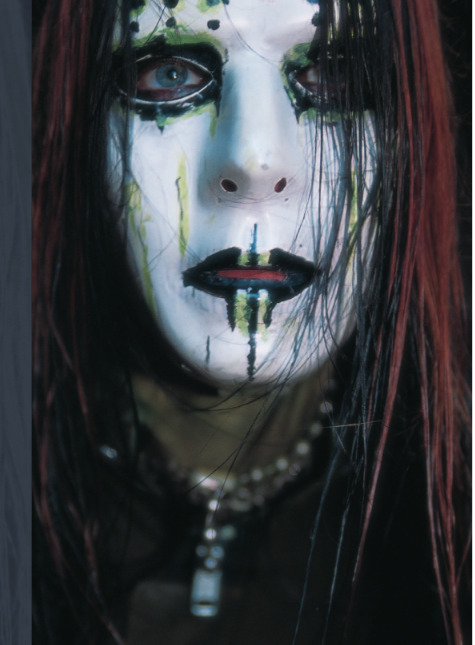
Slipknot’s Joey: Talent Behind The Mask
Interview by Jeff Perlah • Photos by Paul La Raia • January 2002
It’s the final weekend of Ozzfest 2001, and the huge backstage area at PNCBank Arts Center in Holmdel, New Jersey is heating up with heavy metal fever. At the moment, Papa Roach are whipping the crowd into a frothing frenzy with their rap-and punk-inspired approach. Later, the ferocious, nine-member Slipknot will pulverize everyone’s eardrums and eyeballs with their percussion-packed metal, hideous masks, and bad-ass behavior.
I’m shaking hands with Slipknot drummer/songwriter Joey Jordison (a.k.a. #1), whose thin, 5’4’’ frame and baby face is quite a contrast from the bloody Kabuki mask and menacing coveralls he sports on stage. After we chat for a few minutes, the customary backstage vehicle—a golf cart—arrives, and we jump in but almost fall out as the cart zooms away.
“I hate golf,” Joey blurts from the front seat.
“It’s too civilized for Joey,” the driver clarifies, as the cart crunches overplastic forks and other scattered debris while trekking towards the plush Slipknot tour bus.
Joey might not dig golf, but he certainly could afford the whole country-club lifestyle if it appealed to him. Slipknot’s 1999 self-titled Roadrunner debut has sold almost three million copies worldwide and hit number 1 on Billboard’s Heatseekers chart. Now this musical monstrosity—which also features the clattering percussion of Chris Fehn (#3) and Shawn Crahan (#6)—have returned with their scorching second offering, Iowa (also Roadrunner), an even harder-hitting and more intricately woven effort that pays homage to the band’s home turf. The album debuted at number 3 on the Billboard top 200 album chart.
“When we first came out [with Slipknot], we kind of downplayed our home state because we had constantly gotten the middle finger thrown at us for years while we were in previous bands,” Joey says while sipping a Red Bull energy drink inside the air-conditioned bus.
“No radio stations or newspapers would help us, and no one would be at the shows. We did this for like ten years. Those bands broke up around the same time, and Shawn, bassist Paul [Gray, #2], and I got together and said, ‘Let’s make the ultimate band, the band that we would like to see.’ This record is like a tribute, because if we didn’t have the work ethic that we got from being in Des Moines, Iowa—considering there were very few outlets for music there—we wouldn’t have created the band we have now.”
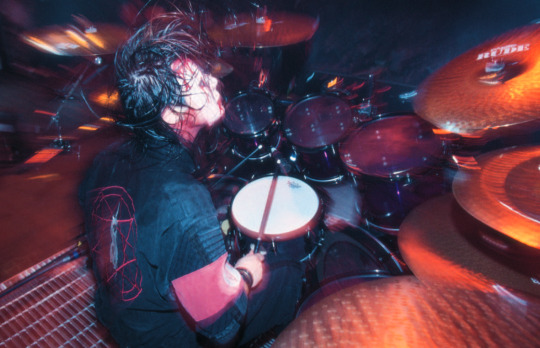
Since Slipknot tied the knot in 1995, their sound has evolved into a seething amalgamation that blends all sorts of metal styles (including speed and death metal) with hardcore punk and electronica. When you enter Iowa, you soon discover how Joey’s chops have matured since Slipknot. All his trademarks, like his speedy double bass kick, rapid hand rolls, eyebrow-raising quadruplets, and black-metal inspired blast beats, sound more powerful and confident.
“On the first record the drums were more raw-sounding,” Joey explains.
“On Iowa they’re punchier, and there’s more technical excellence. I had to use a lot more intricate patterns—and not just do the fast stuff. But if I played a fast part, I made it almost twice as fast and sometimes twice as long.”
Then there’s the way he interlocks with cohorts Chris and Shawn. On scathing statements like “Skin Ticket,” “Gently,” “Metabolic,” and the expansive finale, “Iowa,” it’s painfully clear that this percussion team is no overnight creation.
“You know how hard it is to play the same beat with another drummer?” Joey asks rhetorically.
“It often sounds like flams. But we’ve played together so long, and we’ve had such long, brutal practices for all those dates of touring in two plus years. It just sank in. Now it’s like clockwork. It just flies out of us, and we think as one brain. The thing that makes Slipknot, Slipknot, is the three drummers. People are like, ‘Man, you guys are so heavy!’ A lot of that doesn’t necessarily come from the riffs we write, but from all the drums.”
Indeed, drumming is a subject Joey loves to talk about. At this point, he pulls himself closer to the tape recorder, and the conversation rolls on
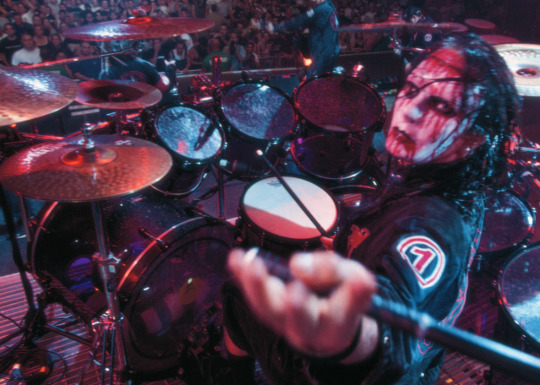
MD: How does Slipknot typically create music? And when are the drums and percussion conceived?
Joey: I handle a lot of the songwriting even before I think about putting drums to anything. Paul and I write most of the music. We usually get a good song structure going, and then we’ll show it to the guitarists. They might throw a riff in or change some chords. And once guitarists Mick [Thompson, #7] and Jim [Root, #4], Paul, and I have the basic core of a song, the band thinks about the percussion parts. A lot of times the percussionists will come in and see what I’m doing and feed off of it a little bit, or I’ll have an idea and say, “Maybe we can go here.” Sometimes they mimic what I do,sometimes they don’t. On “Metabolic,” Shawn plays all the way through to a guitar break, and I don’t even play. He wrote that part. It just depends on what the song calls for. If it’s a straightforward riff, we’ll play really straightforward and powerfully, and kind of mimic eachother.
MD: Did your playing improve while making Iowa?
Joey: Yes. With the first record, we wrote songs and I played what was needed for them. With this record, I had to practice to play the parts that I wanted to write. I had to practice hard for this record. Songs like “Disasterpiece,” “People = Shit,” and “The Heretic Anthem” have the hardest stuff I’ve ever had to do.
“The Heretic Anthem” has fast 16th-note double bass through almost the whole song. Now that I’m so in the groove of doing it, it’s becoming more natural. My body’s accustomed to it and my brain can keep up with what I want to do; it’s kind of like a balancing act between my brain and my limbs.
But I’ll tell ya, in the beginning it was ruthless. I had to jog like two miles everyday before I even did my tracks. That was to help me play the stuff. I used a Gretschmaple kick drum, and it had a great sound. But it was hard to get bounce-back from the head. I almost felt like I was kickin’ mud.
MD: Do you normally run?
Joey: No. Exercise sucks! There’s a reason I wasn’t in track. The jogging was just for the album.
MD: Do you ever get cramps in your legs?
Joey: Occasionally. But it’s not too bad, because I’ve been playing so long on recent tours. I’ve been playing drums for so long that I think my body has gotten accustomed to knowing when it’s gonna get cramps.
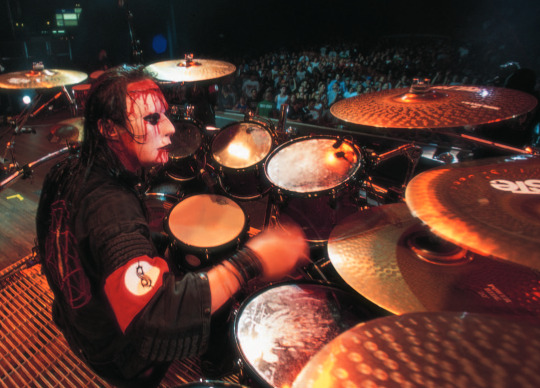
MD: Let’s hear more about the Iowa recording sessions.
Joey: I’ll tell you a funny story: Sound Citystudio in Van Nuys, California is one of the most requested drum rooms. Bands come from all over the world to use this place. So when we were setting up the drums, everyone expected me to set up in their big wooden room. I didn’t. I found the smallest, dingiest room. And my manager was all pissed off. “You’re not using the big drum room?!” And I was like, “Watch!”
We crammed all nine guys in this little room, along with my drumset, so you can imagine how tight it was. That’s how we tracked my drums. Everyone and everything was in my face, and we all had headphones on. We got three or four takes for most of the songs. And it’s cool because the sound of the drums on the new record is so good and punchy that it’s hard to imagine that they came out of that little room. But we do everything opposite of every other band, so it felt natural doing it in a small room as opposed to a big one.
The other guys in the band just played scratch tracks, and we recorded over them later. They were just trying to give me the ultimate vibe. We were sweating and spitting on each other. We record like we perform live—totally slammin’ the whole time. Meanwhile, I had pictures of my family and friends on my work box.
Corey would explain what each song meant before we recorded it, so we’d focus on the initial purpose of the song. The first one we tracked was “People = Shit,” the first song on the CD. The last song we tracked was “Iowa,” the last song on the record.
I remember Corey explaining the whole history of playing in Des Moines, all the ridicule we faced, our rise to success, the touring, and going platinum. He reminded us of how people thought they figured us out and were ready to knock our second album before we even recorded it. He explained a lot of that before we tracked,and it was probably the most pissed off we’ve been before tracking a song.
MD: What was it like recording the title track?
Joey: We did the drumming and percussion in one take. And we sat in silence for probably thirty minutes beforehand and decided not to do any overdubs. At the end I get so out of control and off-time while the percussionists keep the same time with the guitarists. I spaz out so much. Wam wack,woom, voom! [Joey swings his arms wildly] But they keep the same beat. It was totally tribal. It’s such a mental song
MD: Was that the only song you nailed in one take?
Joey: Yep, and it’s the longest song on the album. It’s about fifteen minutes. We were using analog tape. Well, we went analog and then to digital. The only thing that’s analog on the album is my drums because I wanted a ’70s vintage sound. The thing is, 2" analogtape is about fifteen minutes long. Right at the end, [co-producer] Ross Robinson is like,“This is totally kickin’ ass but the tape is gonna run out!” As the last vibration of the guitar faded, the tape ran out.
MD: Did you take any new approaches while recording your drums on Iowa?
Joey: We recorded “Skin Ticket,” but it seemed so light on the drums. It sounded too empty. I was like, “Get me the biggest marching kick drum and snare you can find.” I used those and also cranked up the limiter on the board to make it sound totally static-y, like an AM radio. On the verse of “Skin Ticket,” when Corey’s singing, there are two drum patterns at once, and it’s really trippy. There’s this snare going really light,and the kick is a big, warm timpani.
MD: Does producer Ross Robinson ever influence or inspire your drumming?
Joey: I’m a very busy drummer, and he doesn’t like to take that away from me. But sometimes I need to lay back a little and let the riffs breathe more, rather than play over-the-top. Ross helps me a lot with that. And he helps me to make sure every cymbal hit is like total power. He’s an awesome coach in the studio.
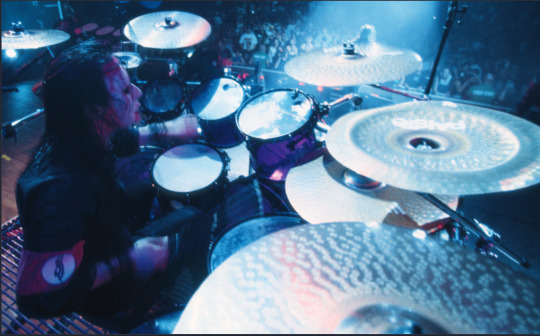
MD: Former Police drummer Stewart Copeland recently told Modern Drummer that he saw you perform in San Bernardino,California during the Tattoo The Earth tour. He said he was impressed.
Joey: I heard that. That blew me away because I’m a big Police fan. “The Other Way Of Stopping” [from 1980’s Zenyatta Mondatta] has really amazing drumming. He’s an amazing drummer regardless, but that song really shows his talent.
MD: Copeland also said that he started practicing with a double pedal because he was inspired by your double bass drumming.
Joey: Really?! That’s like the ultimate honor, because he’s not a metal player. I’ve been inspired by that guy for so long as a drummer and as a composer, even though I play totally opposite of the way he does.
MD: How did you get started drumming?
Joey: I started out playing guitar at my grandpa’s house when I was really young. I got used to it and really liked it. I was playing guitar in a band when I was ten, and my bandmates were older. But the drummer couldn’t keep up and was sloppy. It just got frustrating. So one day I said, “I’ll do it until we find another drummer.” I started working on my drumming, but I never stopped playing the guitar either. I just kept getting better at the drums, and it became my first love.
MD: Were you in many bands before joining Slipknot?
Joey: I was probably in a dozen bands, but I don’t want to name any.
MD: Did you have a day job before Slipknot formed?
Joey: Yeah. I worked in a gas station on the graveyard shift for ten hours a night. Shawn and Paul would come down and we would come up with all these ideas. We scared everyone away because we’d blast Obituary and Deicide all night while coming up withour own ideas. It was like cramming for a test that took place four years later, when we recorded our first album.
MD: How does it all work on stage with you, two percussionists, and six other guys?
Joey: It’s pandemonium. But we thrive on it. And we thrive on pain. Once this band is comfortable, it will cease to exist.
MD: Slipknot performances have been known to be very physical and sometimes out-of-control.
Joey: One time Shawn broke a pipe over a keg. The pipe broke in half, flew in the air, spun around, and cracked me on the head and cut me open—a huge cut. And I’ve pulled my drums down on top of me a hundred times. I have scars all over my body to prove it. There have been broken ribs and fingers, and lots of stitches on all of us. Shawn’s whole knee is bandaged up right now, and he can barely walk. When we get on stage, something just comes out of us, dude. It’s like a war zone. I can’t even put it into words.
MD: How difficult is it to perform with your mask on?
Joey: It ain’t easy. There’s no mouth on my mask really, just a little slit, and the mask is molded to my face. But I built up a tolerance to it. I remember the first show we wore the masks, on April 4th, 1996, and being like, “I can’t believe we came up with this damn idea. What the hell were we thinking?” This was in Des Moines at the Safari Club. It was the same mask back then that I wear now, it just didn’t have the scarlines and blood. Through time, it’s gathered up a bunch of scars.
MD: A couple of years ago, guitarist Mick told me he played a Slipknot show in a Little Bo Peep costume.
Joey: Oh yeah! [laughs] That only happened once. We did it as a joke at a New Year’s Eve show several years ago in down-town Des Moines. Paul wore a wedding gown, Mick got a Little Bo Peep costume and a big staff. We used to wear different costumes, but then we felt we needed to look more like an army, a solid unit. Let everybody be different as far as the character and face, but still be an army. Now we’re like a gang
MD: Is the band trying to look like monsters with these masks?
Joey: Not at all. We’re trying to look like ourselves from the inside. The mask I wear represents what this music makes me feel like inside. And no one picked anyone’s mask for them. When we put the masks on, we go into a deeper, darker place.
MD: How do the members cue each other on stage? It must be challenging because you’re wearing masks.
Joey: We do it by eye contact, by giving “the big eye.” And we’ve known each other for so long that we know our mannerisms, certain arm movements, finger gestures, or whatever. Sometimes I’ll cue them by the way I play. Maybe I’ll take a deep breath and lean back on my seat and smash the cymbals really hard, like for a downbeat, and they’ll know when to come in.
MD: Does the band separate their on-stage personas from their everyday lives?
Joey: We get that poison out every day for about an hour on stage. People ask, “Why are you guys so pissed off?” Well, you keep a baboon locked up for years and then let him out—he’ll have a lot to say. The other twenty-three hours we can rest. We get off so hard for that hour that we get it all out so we can live normal lives on the outside.
MD: What main messages and sentiments does Slipknot convey to their fans?
Joey: We don’t write about stuff we don’t know about. A lot of kids can relate to the things we write about, because they’ve gone through the same things day in and day out.
MD: Like what?
Joey: It depends on who you talk to. And even if we’re talking about a different subject, a kid might relate it to him breaking up with his girlfriend or losing his job. But we’re not talking about politics. We’re not politicians. We’re musicians who grew up in a scene where we were totally rejected. I’m just like those kids. I don’t want to distance myself from their realities. And I want those kids to get their tensions out. We’re the punching bag for them, and they’re the punching bag for us. That’s why the liveshow is so important.
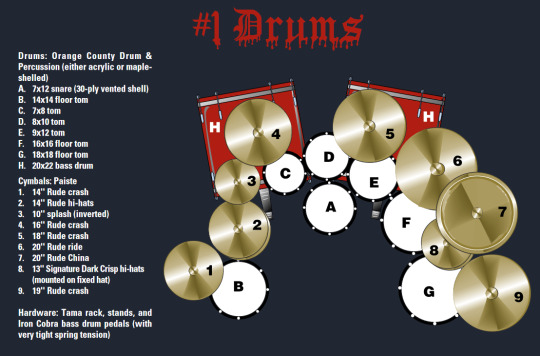
MD: Let’s talk about your kit.
Joey: They’re from Orange County Drum And Percussion. The kit I’m using right now is acrylic. It’s deep purple and see-through, so I can put black lights on it. But I mostly play a maple kit from Orange County. It has a black “serpentine” finish. And my drumsare set up really close together. I can’t be reaching, especially since I’m only 5'4"
MD: Some associate heavy hitters, like metal players, are big brawny guys.
Joey: I find that the big muscle-bound guys tend to be light hitters.
MD: Obviously Slipknot is a very loud band, but anybody who has seen you play knows that you don’t pound the drums into submission. You have a surprisingly light touch.
Joey: The power you get has more to do with how you hit a drum. There’s a certain snap of the wrist that makes the drum resonate right. It comes from years of practice. And you can’t just pound a drum and expect it to sound good.
MD: At what height do you set your seat? Does the height benefit your kick drumming?
Joey: I sit pretty low. I like my knees and heels to be up. That way I get more foot action and get my lower calf muscles involved, as opposed to my legs working. When I use too much leg, I get tired really quickly and it’s too clumsy.
MD: What kind of bass drum pedals do you use to play so fast?
Joey: My pedals are Tama Iron Cobras,double-chained. I have them tensioned very tight. They’re really hard to push down.
MD: Why keep them that way?
Joey: If they’re not tight, I can’t get the right bounce back from the head to be able to play fast. And that spring tension also helps to keep my feet and legs in shape.
MD: On some songs you boast a splashy hi-hat tone. Is one of your hi-hats permanently open?
Joey: My right hi-hat is always open about a half inch, which works perfectly for that sloshy effect. I can open and close my regular left-side hi-hat, so I keep the right one open.
MD: Do you use any unconventional equipment in your kit?
Joey: No, but the percussionists use oilcans, big propane tanks, and old sheet metal. They come up with that weird stuff. It’s their forte.
MD: Some drummers don’t appreciate performing with other percussionists. Yet Slipknot has created an outrageous art form out of three-way percussion.
Joey: Some drummer might say, “I don’t want people stepping on my toes and getting in my face!” I’m not like that. That percussion drives me. It makes me want to be a better player. It makes them want to be better players. We all keep on our toes—no one slacks—because you have two other drummers lookin’ at you at all times! [laughs] I love having it this way. The more drums the better.
MD: And what about your influences? Who has inspired you the most?
Joey: Keith Moon, for sure. And to tell you the honest-to-God truth, it’s because he was a nut. I can relate to his personality. I have a lot of personality on stage too; I’m flippin’ sticks behind my back. Whatever it takes to get the audience off, I’ll do. I like being animated.
MD: That’s not surprising, considering Slipknot’s wildly visual stage show.
Joey: Exactly. Plus the music makes me so nuts that I can’t sit still anyway. That’s why I like Keith Moon.
MD: Who else?
Joey: John Bonham, of course. How can you not give that guy props? And of course, when I was younger, there was Peter Criss of KISS. I love that band so much. I remember practicing Peter’s solo on “100,000 Years” off Alive! I had it down to a tee at nine years old. Then I learned the solo from Alive II. Another drummer I have to give props to is Dave Lombardo, formerly of Slayer. On “Angel Of Death,” one of the most famous Slayer songs, he does a really long double bass roll and then three tom hits. I do that exact fill in the middle of “The Heretic Anthem” as a tribute to Dave. He’s definitely one of my main influences. I’m into death metal and black metal too, and all their drummers, like Trym from Emperor, Nick Barker from Dimmu Borgir, Hellhammer from Mayhem. A lot of these kids at Ozzfest have never heard the blastbeats prevalent in black metal. But we’re not a death or black metal band. We don’t want to be, yet we still have our influences.
MD: KISS must have been a big influence on Slipknot, considering their use of costumes and other visual elements.
Joey: We drew a lot from KISS, no question. We’re like a hellish version of them. Every musician’s a thief, everyone steals, but it’s what you do with it—how you make it your own and piece it together—that makes you original. You get the influence, punch it in the face, and see what you come up with.
MD: What advice would you give to up-and-coming drummers?
Joey: Have ingenuity and perseverance—and practice a lot. That’s the only way you’re going to make it. And don’t just be a follower, be a leader. A lot of players don’t realize what they have. To me, the most important band out right now is the one in a garage somewhere obsessing over their music, just like we did ten years ago. We were those kids. We haven’t heard of them yet, but they’re the ones with the vision. As far as I’m concerned, those are the most important musicians right now and the ones who are gonna shape the future.
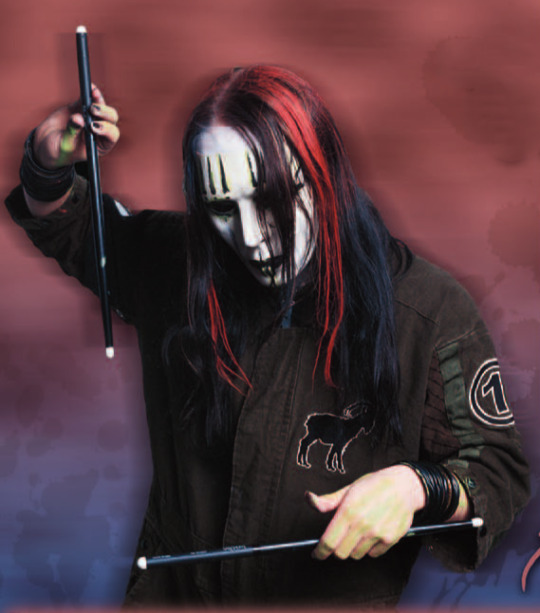
161 notes
·
View notes